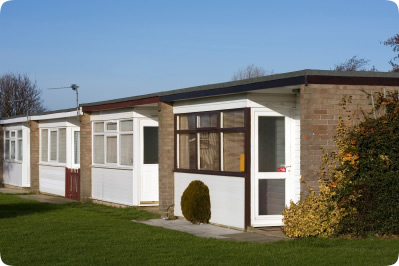Holiday Chalets
Often buying a holiday chalet is very much an emotional decision based on a fantastic holiday experience at the chalet’s location. There are certainly many benefits of owning your own holiday chalet. They are generally cheaper than a holiday cottage and more substantial than a holiday caravan.
Here are a few things you should consider when buying a holiday chalet.
- Don’t let your heart rule your head. It's very easy to fall in love with the idea of a holiday chalet that you can enjoy loads of ‘free’ holidays in whenever you want. You must ensure that you keep a business head on at all times and consider what the costs are of owning the chalet that you are looking to buy.
- Many chalets or offered for sale on a lease or licence which means you don’t actually own the land they are sited on. Often there is an annual charge for the lease or licence and this can vary hugely from site to site. If the chalet is on a park then you will have to pay a fee to access the amenities on the site, again this can vary widely depending on the park. A few parks offer chalets for sale on a freehold basis which is where you own the land the chalet is sited on. There may still be a fee to access the amenities on the park so it's worth checking these things out before you buy.
- How will you use the chalet? If you plan to keep the chalet for yourself to use when you want to it will limit your options in letting it out as it will not always be available. It’s hard to make a business case for owning a chalet stack up based on renting it out as there are plenty of costs involved in doing that. Holiday letting companies will want up to 30% commission for letting your property, more if they do the key management etc. There are cleaning costs, maintenance costs and some sites also want a fee if you sublet your chalet. These costs can mount up so it’s rare to make a case to buy a chalet based on a letting business. If you live local to the chalet (i.e. manage cleaning and keys yourself) and advertise it yourself on sites like cottages4holidays-uk.com for example it’s possible to make a small profit as a rental business.
- Once you have decided that a chalet is for you then you need to decide the location. Often you will have already done this as it’s the location that attracted you to the idea. See what’s around and if it will be enough to make you want to go for many holidays in the location. A rural isolated location is great for one or two holidays but a 20 mile trip to the shops, no phone signal and being completely cut off can wear thin after a few holidays.
- What is the state of the chalet you are considering together with others around yours. Letting out your chalet will be difficult if the chalet or other chalets on the site are run down and needing work done. Chalets in poor state of repair or amenities that are run down may indicate that the site is being neglected and this will make it very hard to sell your chalet in the future.
- Chalets hold their value generally much better than lodges and static caravans but do not appreciate in the same way as cottage for example.
- Check out the legal commitments that the site has when you buy. What are the costs, if you sell do you have to pay them a commission, do they have a subletting scheme – costs etc.
- How much will holiday chalet insurance cost. Many sites have deals with specific insurers which provide the site owner with a commission. Make sure you compare quotes from other chalet insurance providers to see what the premiums are likely to be.
- How many weeks of the year is the site open, what are the local plans, if its close to the coast how much erosion is in the area – that last thing you want to see is your chalet becoming part of the beach
